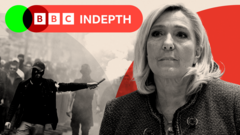France's far-right is in turmoil after a court ruling disqualified Marine Le Pen from the next presidential election, igniting outrage and complicating political dynamics as potential successors emerge and internal factions react.
Marine Le Pen's Disqualification Sparks Intense Far-Right Backlash in France

Marine Le Pen's Disqualification Sparks Intense Far-Right Backlash in France
The far-right National Rally faces internal and external challenges following Marine Le Pen's court-ordered ban from the 2027 presidential race, raising questions about the future of the party and its strategies.
In a tumultuous week for French politics, the National Rally (RN) and its leader Marine Le Pen have erupted in protest following a court ruling that bars her from contesting the upcoming 2027 presidential election due to her involvement in a corruption scandal. The far-right party has aimed to harness public outrage over what they describe as an unjust ruling, creating a political atmosphere charged with indignation.
Statements from Le Pen’s allies have flooded television screens, urging supporters to 'be outraged' at what they perceive as an affront to democracy. Despite the fervor, political observers remain unsure whether this incident will unify the RN or cause deeper divisions within the far-right movement. Le Pen has openly accused the French justice system of political bias and tyranny, claiming that the verdict serves only to obstruct her path to power.
In a press conference, she compared herself to Alexei Navalny, portraying the court’s decision as a severe and unprecedented attack on democratic rights. The fallout has drawn scrutiny from other political leaders; Prime Minister François Bayrou expressed concerns about potential political instability arising from the ruling.
Interestingly, an immediate public opinion poll revealed that a significant portion of the French populace—about 31%—felt the court’s verdict was appropriate. This tempered response challenges the RN’s attempts to cast Le Pen as a martyr among voters. With the presidential election still two years away, uncertainties persist surrounding potential rival candidates who could emerge from both leftist and centrist parties.
Le Pen’s legal troubles stem from a comprehensive investigation into her party’s financial misconduct involving the European Parliament, which has culminated in a five-year ban from holding public office. Despite her defiance and refusal to admit guilt, analysts suggest that a more cooperative approach might have yielded a less severe punishment.
Reflecting on the broader landscape, the RN’s strategy can be seen as a paradox. While public sentiment remains attached to traditional political structures, the far-right is motivated by a narrative of victimhood. The imminent leadership prospects within the RN now focus on 29-year-old Jordan Bardella, who may be poised to take over if Le Pen's challenges continue. His appeal resonates especially with younger voters frustrated by economic conditions and immigration issues.
As the political situation evolves, the risk of instability in the coalition government rises, leading some to speculate about the potential for new elections. Should Bardella or other rising figures in the RN capitalize on Le Pen's disqualification, they could either fortify the party’s political base or struggle with the transition from outrage to electoral success.
Ultimately, the court's judgment may become a pivotal moment in France's political narrative, foreshadowing either the ascension of a groundbreaking female president or an enduring legacy of lost opportunities for the far-right as they confront the barriers of corruption and public skepticism. The outcome will depend heavily on how Le Pen and her party navigate their internal challenges in the face of external opposition.




















